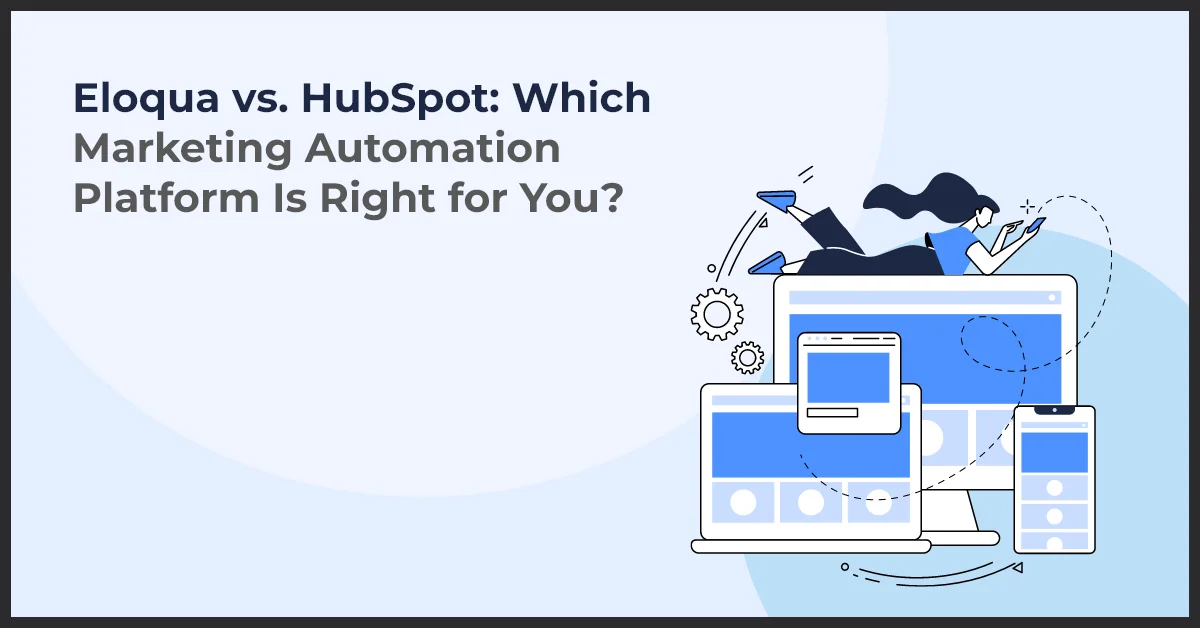Unlock Your Business’s Potential with Marketing Automation

Published on: October 30, 2023
Updated on: July 02, 2024
1374 Views
- Marketing Automation
17 min read
Marketing automation is revolutionizing the way businesses engage with their customers and drive growth. By definition, marketing automation refers to the use of software platforms and technologies to streamline and automate marketing tasks and workflows, saving precious time and resources in the process.
Implementing marketing automation in your business can bring forth a multitude of benefits and advantages. Firstly, it enables you to enhance customer targeting and personalization by segmenting your audience based on their preferences, behaviors, and demographics. This way, you can deliver highly tailored and relevant messages to each individual, resulting in increased engagement and conversions.
Furthermore, marketing automation empowers you to nurture leads and build lasting relationships with your customers through automated email campaigns, personalized content delivery, and seamless follow-ups. By automating communication, you can ensure timely interactions that keep your brand top of mind and establish trust and credibility.
Additionally, marketing automation enables better marketing and sales alignment by providing valuable insights and analytics. With detailed tracking and reporting, you can measure the effectiveness of your campaigns, identify areas of improvement, and optimize your marketing strategies accordingly, resulting in higher ROI and revenue growth.
Role of Marketing Automation in Email Marketing
Marketing automation tools play a crucial role in enhancing the effectiveness of email marketing campaigns. They enable businesses to send personalized and targeted emails to their subscribers, resulting in higher engagement rates and conversions.
How Marketing Automation Tools Aid in Personalized and Targeted Email Marketing
Marketing automation tools provide businesses with the ability to segment their email lists based on various criteria such as demographics, interests, and past behavior. By dividing their subscribers into smaller, more specific groups, businesses can create personalized email content that resonates with each individual recipient.
These tools also allow businesses to automate the process of sending emails triggered by specific actions or events, such as a subscriber's birthday or an abandoned cart. This level of automation ensures that the right message is delivered to the right person at the right time, increasing the chances of conversion.
Importance of Automation in Email Campaigns for Lead Nurturing and Conversion
Automation plays a vital role in nurturing leads and guiding them through the customer journey. With marketing automation, businesses can set up automated email workflows that deliver relevant content to prospects at every stage of the sales funnel.
For example, when a new lead fills out a form on a website, marketing automation can automatically send them a welcome email followed by a series of nurturing emails over time. These emails can provide valuable information, address common pain points, and highlight the benefits of the business's products or services. By consistently delivering valuable content, businesses can build trust and credibility with their leads, ultimately increasing the likelihood of conversion.
Overall, marketing automation plays a critical role in email marketing, allowing businesses to deliver personalized and targeted emails, nurture leads, and increase conversion rates. By leveraging the power of marketing automation tools, businesses can optimize their email campaigns and achieve greater success in their marketing efforts.
Marketing Automation for Lead Generation
Marketing automation plays a crucial role in capturing, nurturing, and scoring leads for businesses. It provides a systematic approach to managing leads throughout the customer journey, ensuring that no potential customer falls through the cracks.
One of the key benefits of marketing automation for lead generation is the ability to capture leads automatically. By integrating marketing automation tools with your website, you can create lead-capture forms that gather information from visitors. This allows you to build a database of potential customers and begin nurturing these leads through targeted email campaigns.
Once leads are captured, marketing automation enables businesses to nurture them by delivering personalized and relevant content at every stage of the buyer's journey. Through automated email workflows, you can send out a series of targeted emails to educate, engage, and ultimately convert leads into customers.
In addition to capturing and nurturing leads, marketing automation also provides tools and strategies for lead scoring. Lead scoring is the process of assigning a value to each lead based on their level of interest and engagement with your brand. By scoring leads, businesses can prioritize their follow-up efforts, focusing on leads that are more likely to convert into customers.
Automated lead generation techniques and strategies such as lead scoring, lead nurturing workflows, and personalized content delivery are all key components of marketing automation for lead generation. Implementing these strategies not only helps businesses generate more leads but also drives higher conversion rates and an improved return on investment.
Integrating Marketing Automation with CRM Systems
Integrating marketing automation with customer relationship management (CRM) systems can revolutionize the way businesses manage their customer interactions and sales activities. By combining these two powerful tools, companies can unlock a plethora of benefits that can boost their bottom line.
Impact and benefits of integrating marketing automation with CRM systems
The impact of integrating marketing automation with CRM systems is multi-fold. Firstly, it enables seamless synchronization of customer data between the two platforms, providing businesses with a consolidated view of their customers. This 360-degree perspective allows marketers to tailor their marketing campaigns and communication efforts based on individual preferences and behaviors, resulting in more personalized interactions and improved customer satisfaction.
Secondly, CRM integration facilitates effective lead management by automating lead scoring and nurturing processes. When a lead shows interest or meets specific criteria, marketing automation can automatically assign them a score and trigger relevant communication workflows, ensuring that leads are nurtured and moved through the sales funnel efficiently. This automated lead management results in increased conversions and accelerated sales cycles.
Thirdly, integrating marketing automation with CRM systems streamlines sales and marketing alignment. By sharing data and insights in real-time, sales and marketing teams can collaborate more effectively, align their strategies, and work towards shared goals. This alignment eliminates the silos between the two departments and fosters a cohesive approach to customer engagement, leading to greater revenue growth.
Effective management of customer interactions and sales activities through automation
With marketing automation integrated with CRM systems, businesses can effectively manage their customer interactions and sales activities through automation. This automation extends beyond just sending automated emails and includes activities such as lead scoring, lead nurturing, and tracking of customer touchpoints throughout the sales funnel.
Automating these processes ensures that no lead falls through the cracks, no customer is forgotten, and no opportunity is missed. Marketing automation with CRM systems empowers businesses to deliver targeted and timely communications, create personalized customer experiences, and optimize customer engagement at every touchpoint.
Leveraging Marketing Automation for Social Media Marketing
Marketing automation not only streamlines email marketing, lead generation, and CRM integration, but it also plays a crucial role in social media marketing. By utilizing various tools and techniques, businesses can effectively schedule, publish, and analyze their social media posts, enhancing their overall social media marketing performance.
One of the key features of marketing automation is the ability to schedule posts in advance, allowing businesses to plan their social media content strategically. With the use of marketing automation tools, marketers can easily create a content calendar and schedule posts to be automatically published at specific times.
In addition to scheduling, marketing automation enables businesses to publish their social media posts across multiple platforms simultaneously. This not only saves time and effort but also ensures consistent messaging and branding across different social media channels.
Furthermore, marketing automation provides valuable insights and analytics for social media marketing. Marketers can analyze their post engagement, audience demographics, and other performance metrics to gain a deeper understanding of their social media efforts. This data can then be used to refine and improve social media marketing strategies.
By leveraging marketing automation for social media marketing, businesses can enhance their overall marketing performance and reach a wider audience. With streamlined processes and data-driven insights, marketing automation proves to be an invaluable tool for maximizing the impact of social media marketing efforts.
Personalization through Marketing Automation
In today's highly competitive market, it's no longer enough to simply send generic marketing messages to your audience. Personalization is the key to driving engagement and increasing conversions. This is where marketing automation comes into play.
Importance of personalization in marketing campaigns
Personalization allows you to tailor your messages to individual customers, making them feel valued and understood. It helps you cut through the noise and deliver the right message, to the right person, at the right time. By personalizing your marketing campaigns, you can create a unique and memorable experience for your customers.
Leveraging customer preferences, behavior, and demographic data for personalized messaging
Marketing automation allows you to gather and analyze data about your customers' preferences, behavior, and demographics. With this valuable information, you can segment your audience and create targeted campaigns that speak directly to their interests and needs.
For example, if a customer has previously shown interest in a particular product or category on your website, you can use marketing automation to automatically send them personalized recommendations or promotions related to those items. This level of personalization can significantly increase the chances of conversion.
By tracking and analyzing customer behavior, you can identify patterns and trends that can inform your marketing strategies. For instance, if you notice that a segment of your audience tends to engage more with video content, you can use marketing automation to deliver personalized video messages to that specific segment.
Analytics and Reporting with Marketing Automation
Marketing automation systems provide robust analytics and reporting features, allowing businesses to gain valuable insights into their marketing campaigns. By utilizing these features, businesses can measure the effectiveness of their campaigns and make informed decisions based on data-driven insights.
The analytics and reporting capabilities of marketing automation systems help businesses track key metrics such as open rates, click-through rates, conversion rates, and more. These metrics provide a comprehensive overview of how well a campaign is performing and can be used to identify areas for improvement.
With marketing automation, businesses can also analyze customer behavior and engagement patterns. By tracking and analyzing data on customer interactions with emails, landing pages, and website content, businesses can gain insights into what motivates their audience and tailor their marketing strategies accordingly.
Furthermore, marketing automation systems offer a variety of reporting tools that allow businesses to generate customizable reports and visualizations. These reports provide a clear and concise overview of campaign performance, making it easy for businesses to communicate results to stakeholders and make data-driven decisions.
- Measure campaign effectiveness: Marketing automation systems enable businesses to measure the effectiveness of their campaigns through various metrics and analytics.
- Gain data-driven insights: By analyzing customer behavior and engagement patterns, businesses can gain valuable insights into what works and what doesn't in their marketing efforts.
- Make informed decisions: With the help of analytics and reporting features, businesses can make informed decisions based on data, rather than relying on guesswork or intuition.
- Create customizable reports: Marketing automation systems offer reporting tools that allow businesses to generate customizable reports and visualizations, making it easy to communicate campaign results to stakeholders.
Workflow Automation for Marketing Efficiency
Workflow automation plays a crucial role in optimizing marketing processes, improving efficiency, and saving valuable time. By automating repetitive tasks, marketers can focus on strategic initiatives and creative campaigns, resulting in enhanced productivity and better outcomes.
There are numerous examples of workflow automation within marketing automation systems that streamline various marketing tasks. These include:
- Email Follow-ups: Automating the process of sending personalized follow-up emails to leads or customers based on specific triggers or actions.
- Subscription Management: Automatically managing subscription lists, sending confirmations, opt-in/opt-out emails, and handling subscription preferences.
- Audience Segmentation: Segmenting the target audience based on specific criteria or behaviors, ensuring more personalized and relevant campaigns.
By implementing workflow automation in these areas and more, marketers can enhance their efficiency, reduce errors, and deliver better experiences to their target audience.
Effective Campaign Management with Marketing Automation
The success of marketing campaigns lies in the ability to effectively create, execute, and monitor them across various channels. This is where marketing automation proves to be an indispensable tool.
With marketing automation, businesses can streamline their campaign management workflow, enabling them to save time and effort. By leveraging automation tools, marketers can automate repetitive tasks such as scheduling emails, social media posts, and ad campaigns.
Marketing automation also facilitates the seamless integration of cross-channel campaigns, ensuring consistent messaging and branding across platforms. This helps in maximizing campaign reach and engagement.
Moreover, automation tools provide valuable insights and analytics, allowing marketers to monitor campaign performance in real time. This enables them to identify what works and what doesn't, allowing them to make data-driven decisions and optimize campaigns for better results.
Overall, effective campaign management with marketing automation empowers businesses to enhance their marketing efforts, reach target audiences more efficiently, and drive better campaign outcomes.
Lead Scoring and Nurturing with Marketing Automation
When it comes to marketing automation, one of the key benefits is the ability to effectively score and nurture leads. By using various tools and techniques, businesses can determine the level of interest and behavior exhibited by their leads, helping them identify the most qualified prospects for conversion. Let's explore the importance of lead scoring and nurturing in marketing automation.
Tools and Techniques for Lead Scoring Based on Interest and Behavior
Marketing automation offers a range of tools and techniques to score leads based on their interest and behavior. These tools analyze various factors such as email open rates, website interactions, form submissions, and content downloads to assign a lead score. The higher the score, the more engaged and interested the lead is.
- Email Open Rates: By tracking the open rates of emails sent to leads, businesses can gauge their level of interest. Leads who consistently open and engage with emails are more likely to be nurtured further.
- Website Interactions: Monitoring how leads interact with a website can provide valuable insights. Actions such as visiting specific pages, clicking on links, or spending a significant amount of time on the website can indicate higher interest and engagement.
- Form Submissions: When leads submit forms on a website, it shows a willingness to engage further. The information provided in the form can also reveal valuable details about the lead, helping businesses personalize their nurturing approach.
- Content Downloads: Leads who download eBooks, whitepapers, or other resources are likely to have a higher level of interest. Analyzing the type and frequency of content downloads can help prioritize and tailor the nurturing process.
Nurturing Leads Until They Are Ready for Sales Engagement Using Automation
Once leads have been scored, marketing automation enables businesses to nurture them until they are ready for sales engagement. Nurturing involves providing relevant and personalized content to leads at different stages of their buyer's journey.
Through marketing automation, businesses can set up automated email workflows that deliver targeted content, educational resources, and promotions based on a lead's engagement level and score. This helps build trust, credibility, and brand awareness over time, ultimately increasing the likelihood of conversion.
Additionally, marketing automation allows businesses to track and analyze lead behavior throughout the nurturing process. By monitoring email opens, clicks, and website interactions, it becomes easier to identify the specific touchpoints that resonate with leads. This information can then be used to optimize future nurturing efforts and improve overall conversion rates.
Sales and Marketing Alignment through Marketing Automation
Effective lead management is crucial for the success of any business. It requires a seamless collaboration between the sales and marketing teams. Marketing automation plays a vital role in aligning these two departments for enhanced lead management.
Importance of aligning sales and marketing efforts for effective lead management
Lack of alignment between the sales and marketing teams can lead to missed opportunities and wasted resources. When these two departments work in silos, it can result in inconsistent messaging, conflicting goals, and poor lead handoff. By aligning their efforts, businesses can achieve:
- Increased conversion rates
- Shorter sales cycles
- Improved customer experiences
- Higher revenue
Communication, lead data sharing, and result visibility facilitated by marketing automation systems
Marketing automation platforms enable seamless communication and collaboration between the sales and marketing teams. These systems provide a centralized platform where both teams can access and share valuable lead data and insights in real time. With marketing automation, the sales team can have clear visibility into marketing activities, lead engagement, and nurture campaigns. This transparency helps both teams make data-driven decisions and align their efforts toward achieving common goals.
Importance of Data in Marketing Automation
Data plays a crucial role in driving effective marketing automation strategies and campaigns. With an abundance of customer data available, businesses can collect, analyze, and utilize this information to optimize their automation processes and achieve remarkable results.
- Collecting Customer Data: Marketing automation allows businesses to capture a wide range of customer data, including demographics, behaviors, preferences, and interactions. This valuable information helps create detailed customer profiles and segmentations.
- Analyzing Customer Data: By analyzing the collected data, businesses can identify patterns, trends, and insights about their target audience. This enables them to make data-driven decisions and tailor their marketing strategies to meet the specific needs and preferences of individual customers.
- Utilizing Customer Data: Leveraging customer data in marketing automation enables businesses to deliver personalized and targeted messages at every stage of the customer lifecycle. By understanding customer behaviors and preferences, businesses can automate relevant communications, increase engagement, and drive conversions.
- Optimizing Automation Processes: The data collected through marketing automation provides valuable insights into the performance of campaigns, workflows, and overall marketing initiatives. With this information, businesses can identify areas for improvement, refine their strategies, and enhance the effectiveness of their automation efforts.
Marketing Automation for Businesses of All Sizes
Marketing automation is not limited to large corporations. Businesses of all sizes can benefit from implementing marketing automation strategies.
Applicability and Benefits
Marketing automation offers numerous benefits for businesses. It helps streamline marketing processes, automate repetitive tasks, and improve efficiency. With marketing automation, businesses can:
- Save time and resources by automating manual marketing tasks
- Improve lead generation and nurturing
- Increase customer engagement through personalized messaging
- Enhance targeting and segmentation for better campaign effectiveness
- Improve sales and marketing alignment
- Gather valuable insights through analytics and reporting
Small Businesses
Small businesses can benefit greatly from marketing automation. It allows them to compete with larger companies on a more level playing field. With marketing automation, small businesses can:
- Automate email marketing campaigns to nurture leads and drive conversions
- Segment their customer base for more targeted marketing efforts
- Personalize their messaging to improve customer engagement
- Track and analyze customer behavior for better decision-making
Medium Businesses
Medium-sized businesses can use marketing automation to scale their marketing efforts and improve efficiency. With marketing automation, medium businesses can:
- Automate lead generation and nurturing to drive more qualified leads
- Integrate marketing automation with their CRM systems for better data management
- Streamline workflow processes for improved productivity
- Analyze marketing campaign performance for data-driven insights
Large Businesses
Large businesses can leverage marketing automation to manage complex marketing operations and enhance customer experience. With marketing automation, large businesses can:
- Execute large-scale, multi-channel marketing campaigns
- Automate customer journey mapping for personalized interactions
- Implement advanced lead scoring models for better lead management
- Use predictive analytics to identify customer behavior patterns and trends
- Improve sales and marketing alignment for increased revenue
Conclusion
In conclusion, marketing automation plays a crucial role in today's competitive market. Throughout this content plan, we have explored the different aspects and benefits of utilizing marketing automation in various areas such as email marketing, lead generation, CRM integration, social media marketing, personalization, analytics and reporting, workflow automation, campaign management, lead scoring and nurturing, sales and marketing alignment, and the importance of data.
By implementing marketing automation strategies, businesses of all sizes can streamline their marketing efforts, improve efficiency, and enhance customer experiences. The ability to automate repetitive tasks target specific audiences, and track campaign performance provides valuable insights and enables effective decision-making.
In today's digitally-driven era, where competition is fierce, marketing automation is no longer just a luxury, but a necessity. It empowers businesses to engage with their customers at the right time, deliver personalized experiences, nurture leads, and ultimately drive revenue growth.
Therefore, it is imperative for companies to embrace marketing automation and stay ahead of the curve. By leveraging its power, businesses can optimize their marketing efforts, strengthen customer relationships, and achieve long-term success in the ever-evolving marketplace.



